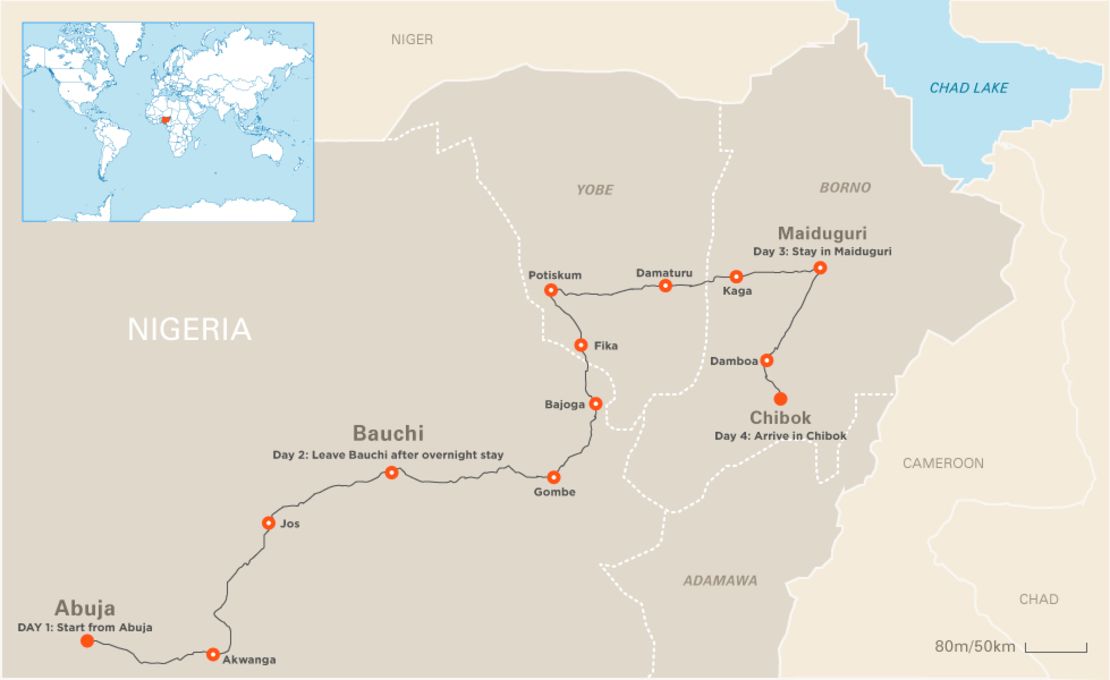Editor’s Note:
Story highlights
On April 14, Boko Haram kidnapped more than 200 girls from a school in Chibok, Nigeria
A CNN team made the dangerous journey to the village in Boko Haram's heartland
CNN correspondent Nima Elbagir spoke to a girl who fled, mothers of abductees and other villagers
She accompanied villagers armed with machetes on their night-time patrol of the area
The militants pulled into the northeastern Nigerian village of Chibok under cover of darkness, their target a girls’ boarding school filled with students ahead of final year exams.
Armed and wearing military uniforms, they told the girls they were there to protect them.
The girls started to assemble in the yard as ordered to, not realizing the men were from Boko Haram – the group whose name roughly translates as “Western education is sin” – until it was too late. More than 200 were loaded onto trucks and spirited away: the group’s leader later announced that he would sell them.

Since the mass abduction on April 14, the world’s attention has been focused on Chibok, but CNN was the first global news organization to send a team to the scene of the atrocity.
The journey from the relative safety of Nigeria’s capital, Abuja, to the remote countryside stalked by Boko Haram can take eight to 10 hours, but logistics and security concerns meant that it took CNN international correspondent Nima Elbagir’s team four days to complete the trek.
For most of the route, the road was tarmacked and the team constantly stopped at checkpoints manned by the military, police or vigilantes looking out for militants. But for the final 45 minutes the tarmac and checkpoints disappeared and the team swerved through the bleak, potholed landscape at full speed with flak jackets beside them.
Read more: The road to Boko Haram’s heartland
Some girls managed to escape Boko Haram, making a desperate dash for freedom after the militants loaded them into cargo trucks.
“We would rather die than go,” one of those girls told CNN. With fear in her eyes and voice, the young woman, who asked not to be identified, described what happened on that horrendous night.
Read more: Escaped schoolgirl describes ordeal
Families had sent their girls to Chibok Girls Secondary School for a desperately needed education but Boko Haram’s attack left the school a burned-out shell.
Chibok is part of Borno state, where 72% of primary-age children never attended school, according to the U.S. Embassy in Nigeria.
The militants destroyed everything they could at the school. One of the girls who managed to flee said their attack had ended both her education and dreams of becoming a doctor.
Read more: How Boko Haram cripples children’s future
Outrage over the mass abduction has prompted a global campaign, calling for the girls to be freed through the Twitter hashtag #BringBackOurGirls.
But in Chibok the outrage is overlaid with despair. CNN’s Nima Elbagir spoke to the mothers of two of the missing schoolgirls.
They described hearing gunfire before discovering their daughters had been taken away.
The kidnapping has left an indelible mark on Chibok. During the day, it looks like a normal village. But at night the fear and terror is visible.
The women, elderly and children go to sleep – and the young men stay awake, doing patrols, keeping vigil.
The men arm themselves with whatever they can – machetes, homemade bow and arrows, in the hope that they will be able to protect their families. CNN’s team joined them.
Read more: Boko Haram threat keeps village awake
Nima and her crew returned to Nigeria’s capital, Abuja, safely.
Around the world, the #BringBackOurGirls campaign continues and foreign governments including the United States, Britain, France, Israel and China have offered help to Nigeria’s government find the girls.
But the schoolgirls are still missing, their relatives still praying for their return and the residents of Chibok still haunted by the attack that left them cowering in the bush as Boko Haram plundered their village.
Full coverage of CNN international correspondent Nima Elbagir’s Chibok journey will screen on CNN International on Saturday 17 May at 2100 CET, Sunday 18 May at 0030 CET, 0400 CET and 1200 CET and Monday 19 May at 0730 CET.








